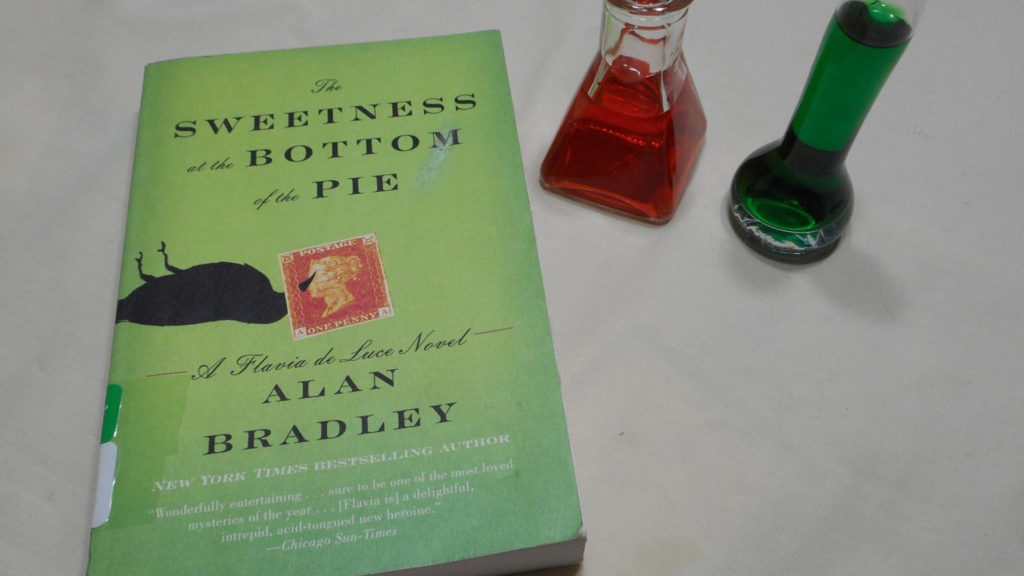I love mystery stories, despite being a terrible detective myself. One of my favorite series (as in pre-order months in advance) is the Flavia de Luce series by Alan Bradley. They have so many things that appeal to mystery lovers: an English countryside setting, a past-its-prime estate, a loyal sidekick. What it has that others don’t is a heroine unmatched in cleverness and sass, Flavia de Luce.
In June of 1950 when the first story “The Sweetness at the Bottom of the Pie” takes place, Flavia is 11.
She lives with her widowed father and two older sisters at Buckshaw, the family estate. All three girls were educated by “various governesses” and are currently without one. They are mostly left to find their own passions. For Flavia, that passion is chemistry, ever since finding her great uncle’s lab and claiming it for herself. Flavia loves the history of chemistry, she loves the chemical reactions, but most of all she loves poisons.
On the late spring morning that the events of “Sweetness” begin, the family’s cook discovers a dead jacksnipe on the kitchen stoop. The bird has a penny black postage stamp impaled on its beak. Flavia finds her father’s reaction far more interesting than the bird itself. Colonel de Luce grabs the stamp and locks himself in his study. He seems so distressed that Flavia fears he might have a heart attack. Later that night Flavia overhears her father arguing with a strange man.
The next morning, this man is dead in the vegetable garden.
After calling the police, Flavia starts investigating on her own. She does this because of her endless curiosity, her irritation that the police won’t let her look in on their inquiries, and concern for her father. After all he was the last person that the dead man spoke with.
Flavia quickly proves to be quite a good detective, even if most of her idea of investigating comes from listening to crime stories on the wireless. Her chemistry skills are helpful but so are the snooping skills that she honed by sneaking into her sisters’ rooms to pilfer candy and read their diaries. She quickly discovers the identity of the dead man and that he was an old school friend of the Colonels. Their friendship had ended when a valuable postage stamp was stolen from the Headmaster’s collection. This was followed by the death of a beloved professor, an event which haunts Col. De Luce 30 years later, more than anything that he had seen in WWII. These serve as the catalyst for the current situation.
Like many precocious children, Flavia is able to charm adults into helping her or giving her information.
No-nonsense yet kindhearted Inspector Hewitt alternates between admiration and exasperation when they interact. She’s also not above feigning illness or outright lying to get what she wants, even saying “I had learned that a lie wrapped in detail, like a horse pill in an apple, went down with greater ease”. She can come off as a bit of a brat sometimes, but this is mostly due to her privileged upbringing and her intelligence. She’s the narrator of the story, so we really see how she feels about people. She really loves the people in her life, even some of the ones that annoy her.
Flavia longs to connect with her father. She longs for his approval and even more to protect him. His admission to her of the direness of their financial situation breaks her heart, and even more the discovery of the fact that one of her favorite hiding places is where her father goes to cry.
Her relationships with her sisters is overshadowed by the loss of their mother.
Harriet de Luce disappeared in the Himalayas ten years earlier. Flavia was only a baby and has no memories of her. Ophelia and Daphne do, and sometimes they hold this over her. A large chunk of their time goes into pranking and snippy comments. Flavia put poison ivy oil in Ophelia’s lipstick as revenge for locking her in the attic. She wants a female role model. In later books Flavia meets Inspector Hewitt’s wife, and is instantly drawn to her.
Flavia’s closest friend is Dogger, the family’s gardener. At first it may seem odd that an 11-year-old girl’s best friend is a man three times her age, but they really get each other. Dogger was a POW with the Colonel during the war and came off the worse for it. Sometimes he has bouts of disassociation. Flavia comforts him when he’s not well and worries about his health. Dogger has useful knowledge to share and councils Flavia away from some of her more reckless ideas. He saved the Colonel’s life several times during the war and Col. de Luce makes sure that he has what he needs and is completely loyal.
I don’t want to give away the ending as it would be terrible to drop any spoilers…
But let’s just say that Miss de Luce’s efforts find her in possession of the key to everything. Flavia is a fun and spunky heroine and the smartypants 11-year-old in me wants us to be friends. Her enthusiasm is why I love this series. Currently there are nine novels and a short story. The audiobook versions are great, too.
Have you read any books in this series? What did you think? Let us know in the comments!
Ready to start this Alan Bradley series for yourself? Shop our Amazon affiliate link here!


Comments are closed.